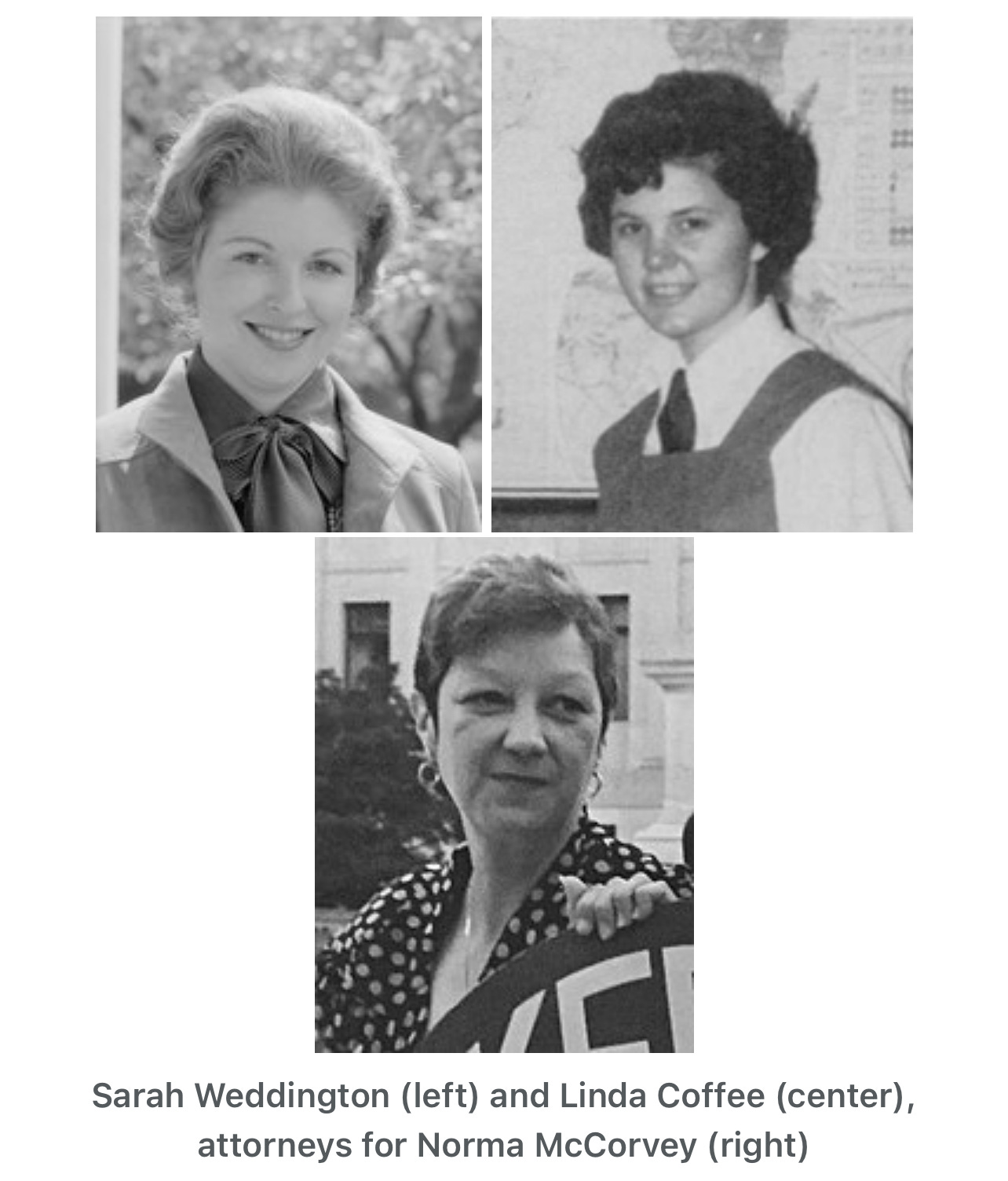Sarah Weddington, the plaintiff’s lawyer in Roe vs. Wade, dies at 76
One determined woman
This Sunday, a lawyer named Sarah Weddington died at 76. Hers is not a name that will be familiar to most people. But she goes down in the history of American jurisprudence as one of the most influential lawyers to plead a case before the Supreme Court.
In 1970, Weddington was a 26-year-old law school graduate from the University of Texas, who was finding it hard to get a job with a Texas law firm. Because in 1970, the old boys’ network wasn’t about to let women into the inner sanctum. Nor did they think a woman should have bodily autonomy. These two strands of conservative thought came together when Norma McCorvey approached Weddington and her law school contemporary, Linda Coffee, and asked them to sue the State of Texas for denying her the right to have an abortion.
McCorvey was a pregnant 21-year-old mother of two. She was unprepared to have a third child. But at the time, Texas law only permitted abortion in the case of risk to the mother’s health. Initially, she said she had been raped, but Texas had no exceptions for conceptions arising from rape or incest. She dropped the rape claim, and rape was not part of any further legal proceedings.
Three federal judges heard the case. The lawyer for Texas was Henry Wade, the Dallas County DA. To protect her privacy, McCorvey was known as Jane Roe. On June 17, 1970, the panel decided unanimously in Roe’s favor based on the right to privacy established by the unenumerated rights reserved to the individual in the ninth amendment. Texas appealed the case to the Supreme Court.
The Court heard oral arguments on December 13, 1971. However, as two Justices retired, the case was re-argued on October 11, 1972. On January 22, 1973, the Supreme Court issued a 7–2 decision in favor of Norma McCorvey ("Jane Roe") holding that women in the United States had a fundamental right to choose whether or not to have abortions without excessive government restriction and striking down Texas's abortion ban as unconstitutional. The basis for their decision was their interpretation of the 14th amendment to include a right to privacy.
The effect of the Court’s decision was to grant women a constitutional right to elective abortions before fetal viability, which was then around 22 to 24 weeks. Unfortunately, the court was not nearly as clear what it meant by “excessive government restriction” - which has led to 50 years of conservative states erecting barriers to abortion with waiting periods, mandatory ultrasounds, hospital admitting privileges, strict building codes for women’s clinics, et al.
In 1980, the Hyde Amendment prevented Medicaid funds from being used for abortion except in the case of maternal risk. The original legislation did not even include exceptions for rape and incest. The amendment disproportionately restricted the poor’s access to legal abortions.
Anti-choice activists would have you believe that overturning Roe vs. Wade would make abortion go away. That is a fallacy. The Guttmacher Institute estimated there were over 800,000 illegal abortions in the US in 1968. The only way to reduce the number of abortions is to reduce the number of unwanted pregnancies. But at the same time, as anti-choice activists are lobbying to strip a woman of her rights, they are cutting back on the Obamacare Medicaid expansion, making it harder to get food stamps and welfare, and resisting free daycare and paid parental leave. It makes as much sense as tackling drug trafficking by cutting funding for drug rehabilitation centers. On top of that, they want to mandate teaching ‘abstinence-only’ sex ed, while restricting access to affordable contraception. It is absurd to think you can reduce abortions by relying on teenagers and young adults to have the impulse control many conservative politicians and pastors find unattainable.
Before Roe, elective abortions were only available in Hawaii, New York, California, Washington state, and Washington DC. However, this did give the rich an option unavailable to the poor. If SCOTUS overturns Roe an estimated 24 liberal states will continue allowing elective abortions. But in the 26 red states - despite their promotion of individual liberties and personal freedoms - poor women will once again find themselves behind the eight ball.
Most often the reason for abortion is economic. In 2014, 75% of the women getting abortions were low-income. And 59% of women getting abortions already had at least one child. The vast majority of women who terminate pregnancies are in their 20s and 30s. They are not the flibbertigibbets using abortion as birth control that conservative anti-woman advocates would have you believe.
After Roe, Weddington went on to serve in the Texas House of Representatives and later as general counsel for the US Department of Agriculture and an assistant to President Jimmy Carter. She was also a professor at University of Texas at Austin for 28 years, where she taught courses on leadership and gender-based discrimination.
Carter eulogized Weddington in a statement Monday morning, saying she
"was a warrior in the continuing struggle for equal rights for women. She dedicated her life to that mission and was a leading force for these rights in my administration. Rosalynn and I add our voices to those who mourn her passing."
Rep. Lloyd Doggett (D-TX) said of her,
”While rightfully known for her remarkable victory and continued advocacy for reproductive freedom, I knew Sarah as a friend and fellow legislator who worked effectively for Austin.”
Adding: "Her passion for reproductive freedom was matched by her compassion for our neighbors. She shows the tremendous impact that one determined woman can make," Doggett added.
With the Supreme Court ready to consider a restrictive abortion case from Mississippi, the US is going to need some more determined women. Luckily it has plenty.

